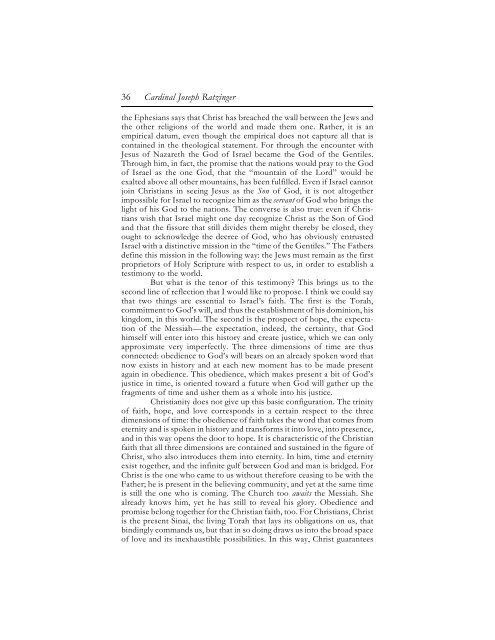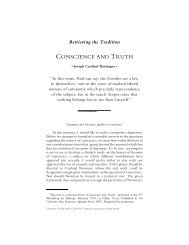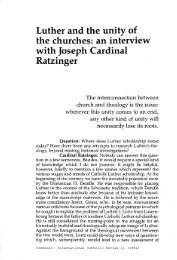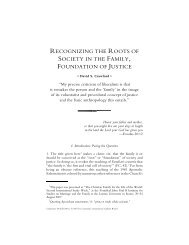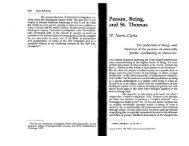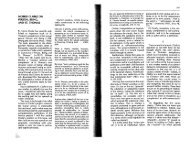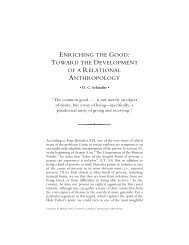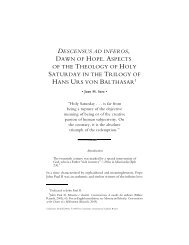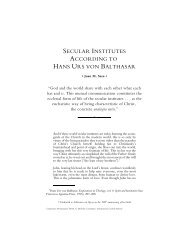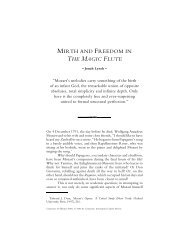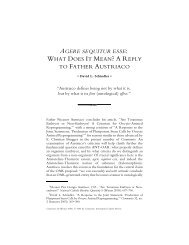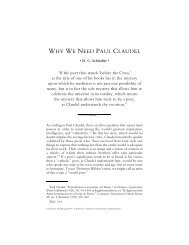Interreligious Dialogue and Jewish-Christian Relations - Communio
Interreligious Dialogue and Jewish-Christian Relations - Communio
Interreligious Dialogue and Jewish-Christian Relations - Communio
You also want an ePaper? Increase the reach of your titles
YUMPU automatically turns print PDFs into web optimized ePapers that Google loves.
36 Cardinal Joseph Ratzinger<br />
the Ephesians says that Christ has breached the wall between the Jews <strong>and</strong><br />
the other religions of the world <strong>and</strong> made them one. Rather, it is an<br />
empirical datum, even though the empirical does not capture all that is<br />
contained in the theological statement. For through the encounter with<br />
Jesus of Nazareth the God of Israel became the God of the Gentiles.<br />
Through him, in fact, the promise that the nations would pray to the God<br />
of Israel as the one God, that the “mountain of the Lord” would be<br />
exalted above all other mountains, has been fulfilled. Even if Israel cannot<br />
join <strong>Christian</strong>s in seeing Jesus as the Son of God, it is not altogether<br />
impossible for Israel to recognize him as the servant of God who brings the<br />
light of his God to the nations. The converse is also true: even if <strong>Christian</strong>s<br />
wish that Israel might one day recognize Christ as the Son of God<br />
<strong>and</strong> that the fissure that still divides them might thereby be closed, they<br />
ought to acknowledge the decree of God, who has obviously entrusted<br />
Israel with a distinctive mission in the “time of the Gentiles.” The Fathers<br />
define this mission in the following way: the Jews must remain as the first<br />
proprietors of Holy Scripture with respect to us, in order to establish a<br />
testimony to the world.<br />
But what is the tenor of this testimony This brings us to the<br />
second line of reflection that I would like to propose. I think we could say<br />
that two things are essential to Israel’s faith. The first is the Torah,<br />
commitment to God’s will, <strong>and</strong> thus the establishment of his dominion, his<br />
kingdom, in this world. The second is the prospect of hope, the expectation<br />
of the Messiah—the expectation, indeed, the certainty, that God<br />
himself will enter into this history <strong>and</strong> create justice, which we can only<br />
approximate very imperfectly. The three dimensions of time are thus<br />
connected: obedience to God’s will bears on an already spoken word that<br />
now exists in history <strong>and</strong> at each new moment has to be made present<br />
again in obedience. This obedience, which makes present a bit of God’s<br />
justice in time, is oriented toward a future when God will gather up the<br />
fragments of time <strong>and</strong> usher them as a whole into his justice.<br />
<strong>Christian</strong>ity does not give up this basic configuration. The trinity<br />
of faith, hope, <strong>and</strong> love corresponds in a certain respect to the three<br />
dimensions of time: the obedience of faith takes the word that comes from<br />
eternity <strong>and</strong> is spoken in history <strong>and</strong> transforms it into love, into presence,<br />
<strong>and</strong> in this way opens the door to hope. It is characteristic of the <strong>Christian</strong><br />
faith that all three dimensions are contained <strong>and</strong> sustained in the figure of<br />
Christ, who also introduces them into eternity. In him, time <strong>and</strong> eternity<br />
exist together, <strong>and</strong> the infinite gulf between God <strong>and</strong> man is bridged. For<br />
Christ is the one who came to us without therefore ceasing to be with the<br />
Father; he is present in the believing community, <strong>and</strong> yet at the same time<br />
is still the one who is coming. The Church too awaits the Messiah. She<br />
already knows him, yet he has still to reveal his glory. Obedience <strong>and</strong><br />
promise belong together for the <strong>Christian</strong> faith, too. For <strong>Christian</strong>s, Christ<br />
is the present Sinai, the living Torah that lays its obligations on us, that<br />
bindingly comm<strong>and</strong>s us, but that in so doing draws us into the broad space<br />
of love <strong>and</strong> its inexhaustible possibilities. In this way, Christ guarantees


